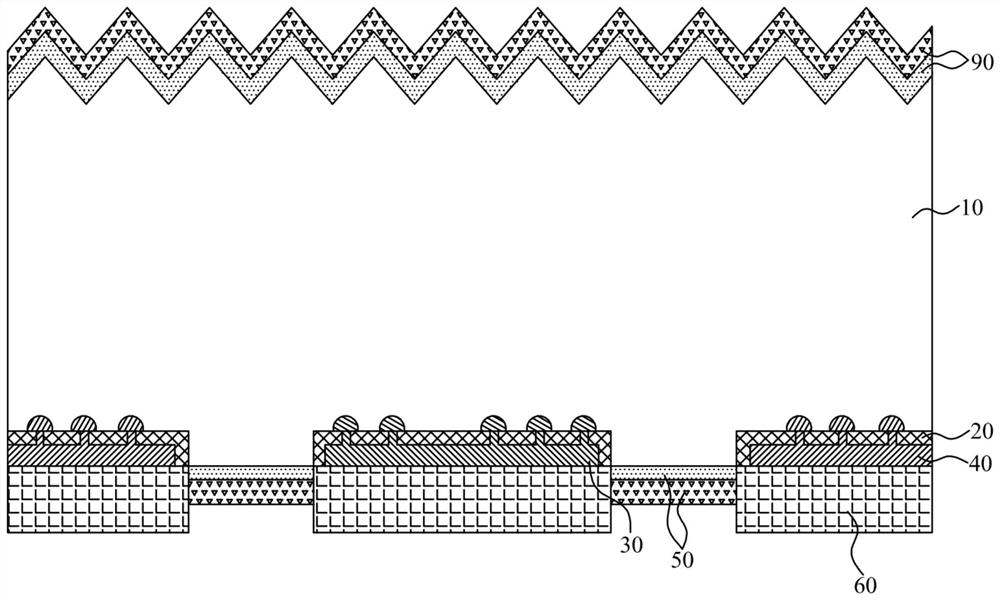Selective contact area buried solar cell and back contact structure thereof
A solar cell and back contact technology, applied in the field of solar cells, can solve the problems of high groove width control requirements and poor passivation effect, and solve the problems of poor passivation effect, loose width control requirements, and high width control requirements Effect
- Summary
- Abstract
- Description
- Claims
- Application Information
AI Technical Summary
Problems solved by technology
Method used
Image
Examples
Embodiment 1
[0080] The first embodiment of the present invention provides a back contact structure of a solar cell. For the convenience of description, only the parts related to the embodiment of the present invention are shown. Refer to Figure 1-Figure 11 As shown, the back contact structure of the solar cell provided by the embodiment of the present invention includes:
[0081] Grooves arranged at intervals on the back side of the silicon substrate 10;
[0082] A first dielectric layer 20 disposed on the back of the silicon substrate 10, the first dielectric layer 20 at least covers the groove;
[0083] P-type doped regions 30 and N-type doped regions 40 arranged on the first dielectric layer 20 and alternately arranged in each groove;
[0084] A second dielectric layer 50 disposed between the P-type doped region 30 and the N-type doped region 40, the second dielectric layer 50 is at least one layer and its refractive index decreases sequentially from the back of the silicon substrate...
Embodiment 2
[0125] The second embodiment of the present invention provides a selective contact area buried solar cell. For the convenience of description, only the parts related to the embodiment of the present invention are shown. Refer to Figure 1-Figure 11 As shown, the selective contact area buried solar cell provided by the embodiment of the present invention includes:
[0126] silicon substrate 10;
[0127] The back contact structure described in the foregoing embodiments on the back side of the silicon substrate 10; and
[0128] The third dielectric layer 90 is disposed on the front surface of the silicon substrate 10 .
[0129] Further, in an embodiment of the present invention, the second dielectric layer 50 and the third dielectric layer 90 can be prepared by preparing the front and back sides of the silicon substrate 10 respectively through the same process, and at this time, the third dielectric layer 90 can be The structure is the same as that of the second dielectric laye...
Embodiment 3
[0136] The third embodiment of the present invention provides a method for fabricating a selective contact region buried solar cell. For the convenience of description, only the parts related to the embodiment of the present invention are shown. Refer to Figure 12 As shown, the selective contact region buried solar cell manufacturing method provided in the embodiment of the present invention is used to prepare the selective contact region buried solar cell as described in the foregoing embodiments. Specifically, the method includes:
[0137] Step S11, creating a plurality of grooves arranged at intervals on the back surface of the silicon substrate;
[0138] Wherein, before step S11, it should also include preprocessing the silicon substrate;
[0139] The above pretreatment includes cleaning the silicon substrate and removing the damaged layer. Specifically, including:
[0140] (1) RCA standard cleaning, remove particles and organic matter on the surface of the silicon subs...
PUM
| Property | Measurement | Unit |
|---|---|---|
| Thickness | aaaaa | aaaaa |
| Thickness | aaaaa | aaaaa |
| Thickness | aaaaa | aaaaa |
Abstract
Description
Claims
Application Information
 Login to View More
Login to View More - R&D
- Intellectual Property
- Life Sciences
- Materials
- Tech Scout
- Unparalleled Data Quality
- Higher Quality Content
- 60% Fewer Hallucinations
Browse by: Latest US Patents, China's latest patents, Technical Efficacy Thesaurus, Application Domain, Technology Topic, Popular Technical Reports.
© 2025 PatSnap. All rights reserved.Legal|Privacy policy|Modern Slavery Act Transparency Statement|Sitemap|About US| Contact US: help@patsnap.com



